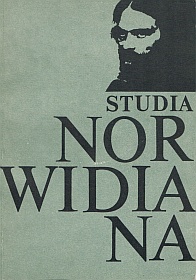Cyprian Norwid’s ”A Dorio ad Phrygium” and Zbigniew Herbert’s „Apollonian” Poems. Parallels
Abstract
The myth about Apollo and Marsyas is the starting-point for the comparisons made in the present paper. The parallel drawn between the poems which are so distant in time but refer to the same tradition is also a contribution to the study of the history of classicism and romanticism in literature.
Norwid knew the legend of Apollo and Marsyas very well and his attitude to the former was ambivalent. As a matter of fact, he recognized Apollo as the patron of an important trend in the art of antiquity but he criticized the imitators of Apollonian (i.e. Dorian-classical) art. However, the Troyan-Phrygian-Dionysian trend which Norwid distinguished himself was recognized by him as a „figure” (in the sense Auerbach used this term) of Polish national-folk art. In ”A Dorio ad Phrygium” whose action is set in Poland after the November uprising in 1830, that is ”a good long time after the Troyan war”, the poet recognized Apollonism as a „figure” of all sorts of fossilized conventions in the sphere of art, political systems and fashion. His poem was constructed in the mode of an autothematic expression. The poem discussing the contest between Apollonism and Phrygian art becomes, under the strength of Norwid’s pen, a ground for a literary play: a play on the opposition between realized poetics (folk-styled) and discursive poetics (a parody of the conventions used in the poetry of antiquity). In both poems by Zbigniew Herbert a similar anti-classicistic opposition is found. Both poems are critical to Apollonism as a prototype of universalistic and autocratic tendencies in art.
In Norwid’s as well as in Herbert’s poetry, art is interlaced with politics and law. The contest between Apollo and Marsyas is undoubtedly a contest between an autocrat and the people; it is an opposition of the nominal (formal or conventional) and actual (true and factual) form of human existence. Both poems are romantic and in both the poets express their disappointment with classicism. Herbert, like Norwid in his invocation of Apollo, puts a processual construction on the development of art. He seems to say: ”we all start with Apollo, we create according to this imposed convention feeling that our efforts are not without their sense and that art is a means of knowing the world”. But in course of time, Dorian ”is taken the place
of ’ by Phrygian. For Herbert this is a chance of originality but this is also a tragedy of the poet’s search in the world where no guide-posts can be found. Norwid criticizes nominalism as well. His poem, however, has no structurally closed construction and therefore it seems to forecast the irresolution of the 20th century poets - exiles from the paradise of the epochs of classical art.
Copyright (c) 1983 Studia Norwidiana

This work is licensed under a Creative Commons Attribution-NonCommercial-NoDerivatives 4.0 International License.





